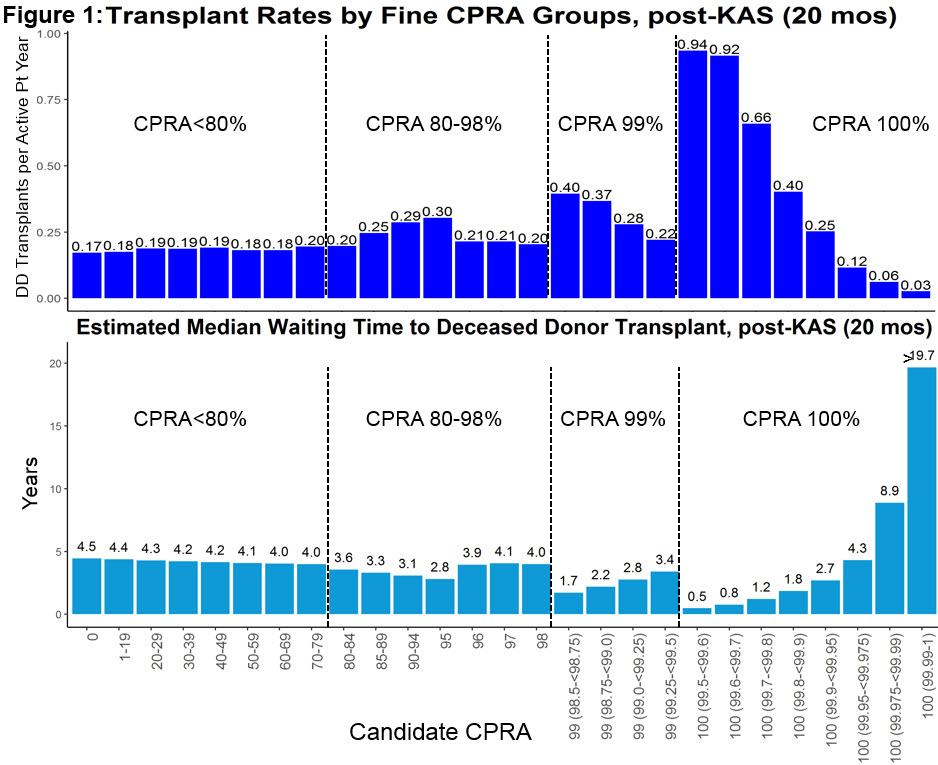Even with National Sharing, the Prospects of a 100% Sensitized Patient Receiving a Transplant Vary Dramatically Depending on the Precise CPRA Value.
1UNOS, Richmond, VA
2Stanford Univ, Palo Alto, CA
3Emory Univ Hosp, Atlanta, GA
Meeting: 2017 American Transplant Congress
Abstract number: 104
Keywords: Alloantibodies, Allocation, Kidney transplantation, Sensitization
Session Information
Session Name: Concurrent Session: Clinical Science: Kidney Immunosuppression: Desensitization
Session Type: Concurrent Session
Date: Sunday, April 30, 2017
Session Time: 4:30pm-6:00pm
 Presentation Time: 4:42pm-4:54pm
Presentation Time: 4:42pm-4:54pm
Location: E354b
Background: In the Kidney Allocation System (KAS), CPRA of 99% & 100% candidates receive regional and national priority. This broader sharing, along with adoption of sliding scale for points, has increased equity in access to transplants. However, early post-KAS analyses suggested transplant access for very highly sensitized patients may vary sharply depending on the precise CPRA value.
Methods: Using OPTN data from Dec 4, 2014 – Jul 31, 2016, we calculated offer and deceased donor transplant rates per active-patient year by granular CPRA. Estimated Median Waiting Times (eMWT) were derived from a Cox proportional hazards model based on period-prevalent kidney candidates on the list Jan 1, 2015 – Mar 31, 2016, with CPRA as the sole (time-dependent) covariate.
Results: For patients with CPRA 99.5-99.6%, rates of receiving offers and transplants were 57 and 31 times higher than for CPRA 99.99%+ patients. On average, CPRA 99.99%+ patients are expected to receive just one offer every 10 years and have eMWT>19.7 years, 40 times longer than the half-year eMWT for CPRA 99.5-99.6% patients. (Fig 1) Yet 59% of CPRA 99.99%+ candidates were listed with max import KDPI<86%. Transplant and offer rates were 40% lower for blood type B patients. As of 11/15/16, 5,192 candidates had CPRA of 100%, with 2,142 having CPRA 99.975%+ and 1,139 with CPRA 99.99%+.
Yet 59% of CPRA 99.99%+ candidates were listed with max import KDPI<86%. Transplant and offer rates were 40% lower for blood type B patients. As of 11/15/16, 5,192 candidates had CPRA of 100%, with 2,142 having CPRA 99.975%+ and 1,139 with CPRA 99.99%+.
Conclusion: With KAS, candidates with CPRA that just rounds to 100% (e.g., 99.5%-99.7%) now have extraordinarily high access to kidney transplants, akin to pediatrics. Conversely, candidates with CPRA above 99.975% have exceedingly low access, and refinements to KAS may not help since they already receive national priority. In partnership with their histocompatibility lab, clinicians should carefully evaluate the antigens listed as unacceptable if CPRA > 99.975% (or lower for blood type B). Patients should be given a realistic assessment of their chances of receiving a deceased donor kidney. Treatment options such as high KDPI transplantation, desensitization, and KPD should be considered.
CITATION INFORMATION: Stewart D, Kucheryavaya A, Tyan D, Gebel H, Bray R, Turgeon N. Even with National Sharing, the Prospects of a 100% Sensitized Patient Receiving a Transplant Vary Dramatically Depending on the Precise CPRA Value. Am J Transplant. 2017;17 (suppl 3).
To cite this abstract in AMA style:
Stewart D, Kucheryavaya A, Tyan D, Gebel H, Bray R, Turgeon N. Even with National Sharing, the Prospects of a 100% Sensitized Patient Receiving a Transplant Vary Dramatically Depending on the Precise CPRA Value. [abstract]. Am J Transplant. 2017; 17 (suppl 3). https://atcmeetingabstracts.com/abstract/even-with-national-sharing-the-prospects-of-a-100-sensitized-patient-receiving-a-transplant-vary-dramatically-depending-on-the-precise-cpra-value/. Accessed February 16, 2026.« Back to 2017 American Transplant Congress
